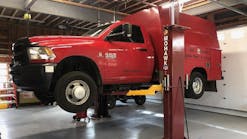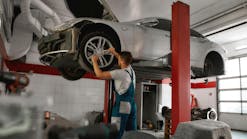Mandatory DVIRs no longer required, says D.O.T.
U.S. Transportation Secretary Anthony Foxx announced a proposal to eliminate a burdensome daily paperwork requirement for professional truck drivers that will reduce costs to the industry by an estimated $1.7 billion annually while still maintaining the Department's high safety standards.
"President Obama challenged his Administration to find ways to cut waste and red tape, a challenge I pledged to meet during my confirmation hearing," said Secretary Foxx. "We are delivering on that pledge, saving business billions of dollars while maintaining our commitment to safety. It's the kind of win-win solution that I hope our Department will continue to find over the coming months."
"This is a great example of the progress being made under the Administration's regulatory lookback initiative," said Office of Management and Budget Director Sylvia Mathews Burwell. "The Administration is carefully examining rules on the books to see where we can streamline, modify or repeal regulations to reduce unnecessary burdens and costs on businesses and consumers. By making this common-sense change to the DVIR process, the Department of Transportation is dramatically reducing paperwork burdens on the trucking industry, while continuing to protect public safety."
Current federal regulations require commercial truck drivers to conduct pre- and post-trip equipment inspections and file Driver Vehicle Inspection Reports (DVIRs) after each inspection, regardless of whether or not an issue requiring repairs is identified. DVIRs are the 19th-highest paperwork burden, based on the number of hours needed to comply, imposed across all federal agencies and only 5 percent of reports filed include defects. This announcement represents the largest paperwork reduction achieved since President Obama's May 2012 Executive Order to reduce regulatory burdens on the private sector.
Under the proposed change announced, commercial truck drivers would continue conducting pre- and post-trip inspections. However, DVIRs would be required only if defects or deficiencies were discovered by or reported to the driver during the day's operations.
"We can better focus on the 5 percent of problematic truck inspection reports by eliminating the 95 percent that report the status quo," said Federal Motor Carrier Safety Administrator Anne S. Ferro. "Moving to a defect-only reporting system would reduce a significant paperwork burden facing truck drivers and save the industry billions without compromising safety."
Federal regulations require that every commercial vehicle in the U.S. undergo a thorough annual safety inspection conducted by a certified commercial vehicle mechanic. In addition, state and federal inspectors conduct unannounced, random inspections of commercial vehicles at terminals, weigh stations, truck stops along the roadside and at destinations. Vehicles that fail random safety inspections are immediately placed out of service and not allowed to operate until the identified safety problems are addressed. In 2012, approximately 3.5 million random inspections were conducted.
In June 2012, the Federal Motor Carrier Safety Administration eliminated a comparable requirement for truck drivers operating intermodal equipment trailers used for transporting containerized cargo shipments. By eliminating a requirement for drivers to submit "no defect" inspection reports of intermodal equipment trailer, cost savings to the intermodal industry is estimated to be $54 million annually without an adverse impact upon safety.
The FMCSA will collect and review comments on the proposed rule, which is available at: www.fmcsa.dot.gov/rules-regulations/administration/rulemakings/proposed/Driver-Vehicle-Inspection-Report-NPRM.pdf.
President Obama launched the Administration's regulatory lookback initiative in January 2011 by issuing Executive Order 13563. The Order commenced an historic government-wide review of regulations on the books, with the goal of eliminating or modifying out-of-date, ineffective or overly-burdensome regulations.

